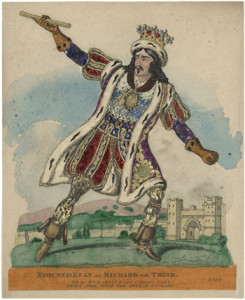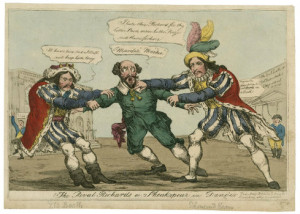I have been avidly following the news about the discovery and identity of the remains of Richard III. I’ve been a sucker for Richard III ever since reading Josephine Tey’s The Daughter of Time--without going so far as to join the Richard III Society or anything (here’s the US R3 Society). I’m already mightily distracted from writing.
This month I attended a couple of events at the Folger, a fantastic resource in Washington DC that those of us who live here tend to take for granted. First, a lecture from the forensic and archaeological team, and then I saw the current production of Richard III which I highly recommend. Here are some interesting snippets from the lecture:
- The team is doing further DNA analysis from tooth tartar (eew).
- Richard III would probably have gone down in history, had the Tudors not taken over, as a just but fair king (the um, issue, of the two princes in the Tower would have been downplayed, just as the Tudors, and Shakespeare, propagandized Richard as a misshapen spawn of Satan).
- Yes, he did have scoliosis. But he was also a seasoned warrior. The BBC (I think) is doing an experiment with a young man with the same degree of scoliosis teaching him horseback warfare, wearing armor, and so far so good. Expect a documentary or two.
 In the Regency, Richard III was one of Edmund Kean’s signature roles but he had a rival–Junius Brutus Booth, father of John Wilkes Booth. Booth’s London career was launched in 1817 in the title role of Richard III at Covent Garden, and thereafter Boothites and Keanites frequently quarreled in theaters. Booth and Kean seem to have both exploited the rivalry, often performing in the same plays.
In the Regency, Richard III was one of Edmund Kean’s signature roles but he had a rival–Junius Brutus Booth, father of John Wilkes Booth. Booth’s London career was launched in 1817 in the title role of Richard III at Covent Garden, and thereafter Boothites and Keanites frequently quarreled in theaters. Booth and Kean seem to have both exploited the rivalry, often performing in the same plays.
 Booth emigrated to the US in 1821 where he led a colorful life as an actor, and is buried in Green Mount Cemetery, Baltimore, where Betsy Bonaparte also lies.
Booth emigrated to the US in 1821 where he led a colorful life as an actor, and is buried in Green Mount Cemetery, Baltimore, where Betsy Bonaparte also lies.
Once again truth is stranger than fiction.
What’s your take on Richard III?
